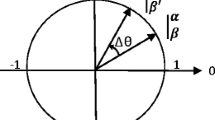Abstract
There are various kinds of supervised classification techniques such as Bayesian classifier, k nearest neighbor, neural network and rule based classifiers. A kind of supervised classifier, estimates the necessary decision hyperplanes for separating the feature space to distinct regions for recognizing unknown put patterns. In this paper a novel swarm intelligence based classifier is described for decision function estimation without requirement to priory knowledge. The utilized swarm intelligence technique is gravitational search algorithm (GSA) which has been recently reported. The proposed method is called intelligent GSA based classifier (IGSA-classifier). At first, a fuzzy system is designed for intelligently updating the effective parameters of GSA. Those are gravitational coefficient and the number of effective objects, two important parameters which play major roles on search process of GSA. Then the designed intelligent GSA is employed to construct a novel decision function estimation algorithm from feature space. Extensive experimental results on different benchmarks and a practical pattern recognition problem with nonlinear, overlapping class boundaries and different feature space dimensions are provided to show the capability of the proposed method. The comparative results show that the performance of the proposed classifier is comparable to or better than the performance of other swarm intelligence based and evolutionary classifiers.




Similar content being viewed by others
Notes
This evolutionary classifier was inserted to comparative results based on one of the reviewers’ comments.
These data sets are available from the site: http://archive.ics.uci.edu/ml/datasets
References
Rashedi E, Nezamabadi-pour H, Saryazdi S (2009) GSA: a gravitational search algorithm. Inform Sci 179(13): 2232–2248
Storn R, Price K (1997) Differential evolution—a simple and efficient heuristic for global optimization over continuous spaces. J Glob Optim 11:341–359
Wang X-Z, He Y-L, Dong L-C, Zhao H-Y (2011) Particle swarm optimization for determining fuzzy measures from data. Inform Sci 181(19): 4230–4252
Wang X-Z, Dong C-R (2009) Improving generalization of fuzzy if-then rules by maximizing fuzzy entropy. IEEE Trans Fuzzy Syst 17(3):556–567
Lin C-M, Li M-C, Ting A-B, Lin M-H (2011) A robust self-learning PID control system design for nonlinear systems using a particle swarm optimization algorithm. Int J Mach Learn Cyber doi:10.1007/s13042-011-0021-4
Mahapatra GS, Mandal TK, Samanta GP (2011) A production inventory model with fuzzy coefficients using parametric geometric programming approach. Int J Mach Learn Cyber 2(2):99–105
Zahiri SH (2010) Swarm intelligence and fuzzy systems, Nova publishers
Huang VL, Suganthan PN, Liang JJ (2006) Comprehensive learning particle Swarm optimizer for solving multiobjective optimization problems. Int J Int Syst 21(2):209–226
Zahiri SH, Seyedin SA (2007) Swarm intelligence based classifiers. Int J Franklin Inst 344(2):362–376
Zahiri SH, Rajabi Mashhadi H, Seyedin SA (2005) Intelligent and robust genetic algorithm based classifier. Iran J Electr Electr Eng 1(3):1–9
Mary PM, Marimuthu S (2009) Minimum time swing up and stabilization of rotary inverted pendulum using pulse step control. Iran J Fuzzy Syst 6(3):1–15
Mehdizadeh E, Sadi-nezhad S, Tavakkoli-moghaddam R (2008) Optimization of fuzzy clustering criteria by a hybrid PSO and fuzzy c-mean clustering algorithm. Iran J Fuzzy Syst 5(1):1–14
Moayedi F, Boostani R, Kazemi AR, Katebi S, Dashti E (2010) Subclass fuzzy-svm classifier an efficient method to enhance the mass detection in mammograms. Iran J Fuzzy Syst 7(1):15–31
Eiben AE, Hinterding R, Michalewicz Z (1999) Parameter control in evolutionary algorithms. IEEE Trans Evol Comput 3(2):124–141
Shi Y, Eberhart R, Chen Y (1999) Implementation of evolutionary fuzzy systems. IEEE Trans Fuzzy Syst 7(2):109–119
Stenes M, Robous H (2000) GA-fuzzy modeling and classification: complexity and performance. IEEE Trans Fuzzy Syst 8(5):509–522
Zahiri SH, Zareie H, Agha-Ebrahimi MR (1996) Automatic target recognition using jet engine modulation on backscattered signals. In: Proceedings of 8th Iranian conference on electrical engineering, Isfahan, pp 296–303
Zhao SZ, Liang JJ, Suganthan PN, Tasgetiren MF (2008) Dynamic multi-swarm particle swarm optimizer with local search for large scale global optimization. IEEE Congress on Evolutionary Computation, Hong Kong, pp 3845–3852
Huang VL, Suganthan PN, Baskar S (2005) Multiobjective differential evolution with external archive. Technical Report Nanyang Technological University, Singapore
Tou JT, Gonzalez RC (1992) Pattern recognition principles, Coden Apmcc
Qin AK, Suganthan PN (2005) Self-adaptive Differential Evolution Algorithm for Numerical Optimizatio. IEEE Congress on Evolutionary Computation, Scotland, pp 1785–1791
Author information
Authors and Affiliations
Corresponding author
Rights and permissions
About this article
Cite this article
Askari, H., Zahiri, SH. Decision function estimation using intelligent gravitational search algorithm. Int. J. Mach. Learn. & Cyber. 3, 163–172 (2012). https://doi.org/10.1007/s13042-011-0052-x
Received:
Accepted:
Published:
Issue Date:
DOI: https://doi.org/10.1007/s13042-011-0052-x




